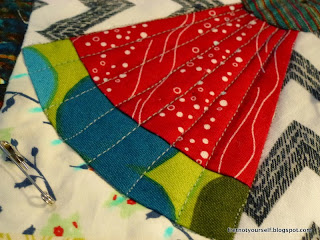When I restarted last week, I decided to put straight lines on the blades. I marked endpoints on each blade and drew lines with a washable blue pen or white chalk, whichever showed up better. I only mark four blocks at a time and always start with the chalked marks since they seem to disappear quickly. By starting where the blades of two propeller blocks meet, I can work my way around all four without stopping. This saves times in starts and stops as well as having fewer threads to bury. I used grey Aurifil 50/2 cotton thread in the top and bobbin for the FMQ.
 |
| By starting where two propellers meet, I can work my way around all four blocks in this set before stopping. |
Because the ditch work subdivided the quilt into 18" sections, I started on an outside row. It's easier to work out problems there rather than in the center of such a large quilt.
Do you know how much I hate marking? What a chore; then it's still hard to see. But... the straight lines provide such a contrast. I usually use my walking foot to make straight lines; however, it was not possible to turn the quilt so frequently (and bunch so much under the quilt arm.) So I've been thinking about ruler work.
Amy's Free Motion Quilting blog has a wonderful section on ruler work with a stationary machine. Her posts share loads of information about how to work with the rulers, which feet to buy or how to adjust your feet so they don't slide under the ruler. My question is how well this will work with my older machine (Bernina 1230.) The throat plate is less than eight inches. Something to ponder.
After all the blades are quilted with straight lines I'll add curved free-motion quilting behind them, finish quilting the sashing, and do something in the border. Not sure what; time will tell.
Enjoy the day, Ann
Do you know how much I hate marking? What a chore; then it's still hard to see. But... the straight lines provide such a contrast. I usually use my walking foot to make straight lines; however, it was not possible to turn the quilt so frequently (and bunch so much under the quilt arm.) So I've been thinking about ruler work.
 |
| Detail of one propeller blade on Steam Punk block |
Amy's Free Motion Quilting blog has a wonderful section on ruler work with a stationary machine. Her posts share loads of information about how to work with the rulers, which feet to buy or how to adjust your feet so they don't slide under the ruler. My question is how well this will work with my older machine (Bernina 1230.) The throat plate is less than eight inches. Something to ponder.
Enjoy the day, Ann